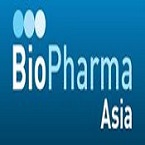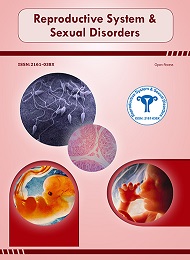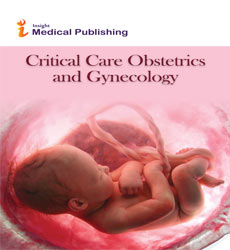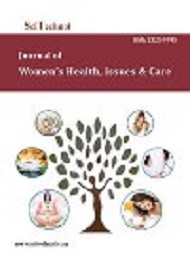Theme: Advancing Womens Health and Integrative Excellence
WOMEN HEALTH CONFERENCE 2024
- Welcome message
- About conference
- Sessions/tracks
- Benefits of participation
- Market Analysis
- Visa Trip Adviser
Women Health and Gynecology 2024 welcomes attendees, presenters, and exhibitors from all over the world! We are delighted to invite you all to attend and register for "3rd world congress on Women health and gynecology " which is going to be held during September 05-06, 2024, at Paries, France to designate from each division which brings you an extraordinary convenience to reach the peers from both academia and industry and to inaugurate a scientific network with them. We warmly welcome all the interested people to come and accompany us at our event and make it prosperous by your involvement and participation.
Our conference will focus on the theme of "Advancing Women's Health and Integrative Excellence," encompassing a wide range of topics related to women's health and gynecology. From pregnancy and childbirth to reproductive health and infertility, our expert speakers will address key issues and provide valuable insights and recommendations.
We invite all interested individuals to join us in making this event a success through your active participation and engagement. Together, let's advance the field of women's health and gynecology, sharing knowledge and fostering cross-cultural understanding of diverse medical sciences and treatments. See you in Paris!
Welcome to the 3rd World Congress on Women Health and Gynecology. slated for September 05-06, 2024, in the picturesque city of Paris, France. Our conference, aptly named WOMEN HEALTH CONFERENCE 2024, serves as a pivotal platform for experts, scholars, and advocates to converge and discuss pressing issues at the intersection of women's health and wellness. With the overarching theme of "Advancing Women's Health and Integrative Excellence," Renowned international speakers as well as specialists in sexual health, reproductive biology, assisted conception, and fertility are available at this conference. This conference brings together people from many backgrounds, including educators, academics, doctors, administrators, and Nobel Laureates.
It offers a forum for the sharing of knowledge and discussion on the most recent developments in women's health.we aim to catalyze meaningfull conversations and initiatives that promote the holistic well-being of women worldwide. Join us as we explore innovative strategies, share ground breaking research, and forage collaborations to drive positive change in women's health outcomes on a global scale.
Track 01:Women Health
Women face distinct health challenges, such as pregnancy, menopause, and issues related to their reproductive organs. A healthy pregnancy can be achieved through timely and consistent prenatal care. Furthermore, it's important for women to undergo regular screenings for conditions like cervical cancer, bone density issues, and other reproductive health concerns.
- Nutrition
- Reproductive health
- Physically active
Track 02:Menstrual Cycle
The menstrual cycle is a complex biological process that occurs in the female reproductive system. It typically lasts about 28 days, although it can range from 21 to 35 days in adults and may vary throughout a person's life.it was controlled by the harmones produced by the brain, which can influence mood, energy levels, and physical symptoms like breast tenderness and bloating. Understanding the menstrual cycle is crucial for reproductive health, contraception, and fertility planning.
Track 03: Assisted Reproductive Technology
The term "assisted reproductive technology" (ART) refers to a range of procedures used to create artificial pregnancy. In addition, procedures including sex selection, surgical sperm retrieval, gamete intrafallopian transfer (GIFT), zygote intrafallopian transfer (ZIFT), and embryo splitting are involved. Cryopreservation, cytoplasmic transfer, egg and sperm donation, and embryo preservation are additional facets of assisted reproductive technology.
Track 04:Cosmetic & Reconstructive Gynecology
Reconstructive gynaecology refers to surgical techniques that aim to restore the structure and functionality of reproductive organs, as opposed to procedures that are solely cosmetic in nature. Similar reconstructive surgeries are performed in a variety of medical specialties, including general surgery, gynaecology, paediatric surgery, cosmetic surgery, and podiatry.the main aim is to restore the normal function and anatomy.
Track 05:Endometriosis
Endometriosis is a chronic and often painful condition where tissue similar to the lining of the uterus (endometrium) grows outside the uterus, commonly on the ovaries, fallopian tubes, and tissues lining the pelvis. This misplaced tissue responds to the menstrual cycle's hormonal changes, causing inflammation, scar tissue formation, and adhesions. Symptoms vary but may include pelvic pain, painful periods, heavy menstrual bleeding, infertility, and pain during intercourse or bowel movements.
Track 06:Gynecologic Oncology
Gynecologic oncology is a specialized field dedicated to the diagnosis and treatment of cancers affecting the female reproductive system. Gynecologic oncologists are trained to provide integrated care, offering expertise in surgical management for conditions like cervical, endometrial, ovarian, vaginal, and vulvar cancers, as well as benign reproductive system disorders such as fibroids and pelvic masses.
- Ovarian cancer
- Uterine cancer
- Cervical cancer
- Vulvar cancer
Track 07: Adolescent and Reproductive Health care
Adolescent and reproductive health care is a crucial aspect of healthcare focusing on the unique needs and challenges faced by teenagers and young adults as they navigate puberty, sexuality, and reproductive health. It encompasses a range of services and education aimed at promoting physical, emotional, and social well-being during this transitional stage of life.Key components include comprehensive sexual education, access to contraception, STI (sexually transmitted infection) prevention and treatment, menstrual health management, vaccinations (such as HPV), pregnancy prevention, and counseling on healthy relationships and consent.
Track 08: Gynecologic Surgeries
Gynecologic surgeries encompass a variety of procedures performed to diagnose, treat, or manage conditions affecting the female reproductive system. These surgeries may be performed for various reasons, including addressing issues related to fertility, managing gynecological cancers, alleviating symptoms of conditions like endometriosis or fibroids, and addressing pelvic organ prolapse or urinary incontinence.
Track 09: Planning and Contraceptive Methods
Family planning and contraception methods play crucial roles in empowering individuals to make informed decisions about their reproductive health. With advancements in medicine and technology, there are numerous options available to help individuals achieve their desired family size or prevent unintended pregnancies. From hormonal contraceptives like pills, patches, and injections to long-acting reversible contraceptives (LARCs) such as intrauterine devices (IUDs) and implants.
Track 10: Gynecology and Obstetrics
Gynecology and obstetrics are essential branches of medicine that focus on women's reproductive health throughout different life stages. Gynecology deals with the diagnosis and treatment of conditions related to the female reproductive system, such as menstrual disorders, infertility, and gynecological cancers.Obstetrics, on the other hand, revolves around the care of pregnant women, encompassing prenatal care, labor and delivery, and postpartum support for both mother and baby.
Track 11: Gynography
Gynography, also known as uterography, is a diagnostic imaging technique used in gynecology to visualize the uterus and fallopian tubes. It involves the injection of a contrast medium into the uterus through the cervix, followed by X-ray imaging to assess the uterine cavity and fallopian tube patency. Gynography is commonly used to evaluate conditions such as uterine abnormalities, tubal blockages, and infertility issues.
Track12: Women’s Public Health
Women's public health addresses the unique health needs and challenges faced by women across the lifespan, encompassing physical, mental, and social well-being. It focuses on promoting equitable access to healthcare services, preventive measures, and health education tailored to women's specific needs and vulnerabilities. It including reproductive health, maternal care, gender-based violence, chronic diseases, and disparities in healthcare access and outcomes.
Track13: Infertility
Infertility is a complex medical condition characterized by the inability to conceive after at least one year of regular unprotected intercourse. It affects millions of couples worldwide, impacting both physical and emotional well-being. Causes of infertility can vary widely and may include factors such as hormonal imbalances, structural abnormalities, reproductive tract infections, age-related decline in fertility, and lifestyle factors.
Track14: Abnormal uterine bleeding
Abnormal uterine bleeding refers to irregular or excessive bleeding from the uterus, which may occur between periods, during menstruation, or after menopause. It can be caused by hormonal imbalances, structural abnormalities, or underlying medical conditions.
Track 15: Abortion and Complications
Abortion, which is the termination of a pregnancy by removing the embryo from the uterus before it can develop outside of it, can happen naturally or intentionally. Women who have been compelled to get abortions frequently suffer health complications. Women opted to abortion may suffer higher rates of infertility, sexually transmitted illnesses, breast cancer, and mental health problems.
Track16: Pediatric Gynecology
Pediatric gynecology is a specialized field of medicine focused on the reproductive and gynecological health of infants, children, and adolescents. It addresses a range of conditions unique to this population, including congenital anomalies of the reproductive tract, menstrual disorders, genital tract infections, and disorders of sexual development.
Track17: Polycystic Ovary Syndrome (PCOS)
Polycystic Ovary Syndrome (PCOS) is a common hormonal disorder among women of reproductive age, characterized by a combination of symptoms that can include irregular menstrual cycles, excess androgen levels (male hormones), and cysts on the ovaries.factors such as genetics, insulin resistance, and hormonal imbalances are believed to play a role. Symptoms can vary widely among individuals and may include irregular periods or no periods at all, acne, excessive hair growth (hirsutism), weight gain, and difficulty conceiving.
Track 18: Reproductive Endocrinology
Reproductive endocrinology is a specialized field of medicine that focuses on the hormonal and reproductive health of both men and women. It encompasses the study and management of hormonal disorders affecting the reproductive system, including conditions such as infertility, menstrual disorders, polycystic ovary syndrome (PCOS), and disorders of sexual development.
Track 19: Medicine & Toxicology
Medicine and toxicology are closely related fields that focus on understanding the effects of substances on the human body, whether for therapeutic or harmful purposes.Medicine encompasses the diagnosis, treatment, and prevention of diseases and medical conditions using various interventions such as medications, surgery, and lifestyle modifications. Physicians, nurses, pharmacists, and other healthcare professionals work together to provide patient-centered care and improve health outcomes.
Track 20: Sexually Transmitted Diseases
STDs are infections transmitted through sexual contact. Common STDs include chlamydia, gonorrhea, syphilis, HIV/AIDS, herpes, HPV (human papillomavirus), and trichomoniasis. Sexually transmitted diseases (STDs), also known as sexually transmitted infections (STIs), are infections that are transmitted through sexual contact, including vaginal, anal, or oral sex. These infections can be caused by bacteria, viruses, or parasites, and they can affect anyone who is sexually active.
Track 21: Medicated Intrauterine Devices
These are intrauterine devices (IUDs) that release hormones (such as progestin) to prevent pregnancy. They are highly effective, long-acting reversible contraceptives. These contraceptive methods boast an exceptional effectiveness rate of over 99% in preventing pregnancy. They are deemed safe for use during breastfeeding, and their effectiveness remains unaffected by medication use.
Types of participation
Women health and gynecology 2024, provides the participants with different modes or ways to participate under either Academic / Student / Business Category.
- Keynote speaker: 45-50 minutes
- Speaker (oral presentation): 25-30 minutes (only one person can present)
- Speaker (workshop): 45-50 minutes (more than 1 can present)
- Speaker (special session): 45-50 minutes (more than 1 can present)
- Speaker (symposium): more than 45 minutes (more than 1 can present)
- Delegate (only registration): will have access to all the sessions with all the benefits of registration
- Poster presenter: can present a poster and enjoy the benefits of delegate
- Remote attendance: can participate via virtual mode or video presentation or e-poster presentation
- Exhibitor: can exhibit his/her/their company’s products by booking exhibitor booths of different sizes
- Media Partner
- Sponsor
- Collaborator
Advantages of participation on women health and gynecology
For attendees:
1.Education and Awareness: Attendees gain access to up-to-date information, research findings, and best practices in women's health and gynecology, increasing their knowledge and awareness of relevant issues.
2.Professional Development: Attending conferences, workshops, and seminars allows attendees to enhance their skills, learn new techniques, and stay abreast of advancements in the field, contributing to their professional growth and expertise.
3.Networking Opportunities: Events provide a platform for attendees to connect with peers, experts, and leaders in women's health and gynecology, facilitating valuable networking, collaboration, and mentorship opportunities.
4.Access to Resources: Participants can explore exhibitions, resource centers, and informational materials, gaining access to tools, products, and services that can support their practice or research endeavors.
5.Continuing Education Credits: Many events offer continuing education credits or certificates, enabling attendees to fulfill professional development requirements and stay current in their respective fields.
6.Inspiration and Motivation: Engaging with colleagues and hearing from thought leaders can inspire attendees, reigniting their passion for their work and motivating them to make meaningful contributions to women's health.
7.Contribution to Improvements: By participating in discussions, sharing experiences, and providing feedback, attendees can contribute to the advancement of women's health research, policy development, and clinical practice, ultimately improving outcomes for women worldwide.
Benefits for Speakers:
1.Knowledge Sharing: Speakers have the opportunity to share their expertise, research findings, and insights with a diverse audience, contributing to the collective knowledge base in women's health and gynecology.
2.Professional Visibility: Presenting at conferences, symposiums, or workshops enhances speakers' visibility within the field, establishing them as thought leaders and experts in their respective areas of specialization.
3.Networking Opportunities: Speaking engagements provide speakers with opportunities to connect with fellow professionals, researchers, and industry leaders, fostering valuable networking relationships and potential collaborations.
4.Career Advancement: Presenting at prestigious events can enhance speakers' professional reputation, open doors to new career opportunities, and potentially lead to invitations for future speaking engagements or collaborations.
5.Impactful Contribution: Speakers have the platform to address important issues, share innovative solutions, and advocate for advancements in women's health and gynecology, making a meaningful impact on the field and influencing positive change.
6.Personal Development: Preparation and delivery of presentations can enhance speakers' communication skills, presentation abilities, and confidence, contributing to their personal and professional development.
7.Contribution to the Community: By sharing their knowledge and expertise, speakers contribute to the advancement of women's health research, education, and clinical practice, ultimately improving outcomes for women's health globally.
Benefits for Delegates:
1. Knowledge Acquisition: Delegates have the opportunity to learn from renowned experts, researchers, and practitioners in the field, gaining insights into the latest developments, research findings, and best practices in women's health and gynecology.
2.Networking Opportunities: Events provide delegates with a platform to connect with peers, colleagues, and industry professionals from around the world, facilitating valuable networking, collaboration, and knowledge exchange.
3.Access to Resources: Delegates can explore exhibitions, poster sessions, and informational materials, gaining access to resources, tools, and products that can support their practice, research, or academic endeavors.
4.Continuing Education: Many events offer opportunities for delegates to earn continuing education credits, certificates, or professional development units, helping them stay current in their respective fields and ful fill continuing education requirements.
5.Professional Development: Attending presentations, workshops, and panel discussions allows delegates to enhance their skills, broaden their knowledge base, and stay abreast of advancements in women's health and gynecology, contributing to their professional growth and expertise.
6.Sharing Experiences: Delegates have the opportunity to share their own experiences, insights, and challenges with fellow attendees, fostering discussions and collaborations that can lead to new ideas, solutions, and approaches to addressing women's health issues.
7.Advocacy and Engagement: By participating in discussions, sessions, and forums, delegates can advocate for important issues in women's health, raise awareness about key topics, and contribute to shaping policies and initiatives that promote the health and well-being of women globally.
Women health and gynecology 2024 explains about the uncomfortable cramps or irregular periods is common for many women, it's important not to accept these symptoms as normal. There are numerous surgical and medical intervention techniques available to address menstrual abnormalities, urinary incontinence, and other gynecological conditions. If you experience severe cramps, intense abdominal pain, prolonged bleeding between periods, or discomfort during sexual activity, it's crucial to consult with your doctor as these symptoms could indicate a more serious women's health issue.
Women's health devices encompass a range of products aimed at enhancing women's healthcare, covering areas such as maternal and menstrual health, pelvic and sexual health, fertility, menopause, and contraception, as well as addressing various general health disorders that affect women disproportionately or differently, such as osteoporosis or cardiovascular disease. These devices enable women to monitor their health and access health-related data through at-home tests and other features. Main product types include surgical, diagnostics, contraceptives, labor and delivery, and critical care devices. Applications span across cancer, osteoporosis, infectious diseases, uterine fibroids, post-menopausal syndrome, pregnancy, female sterilization, and other areas. Women's health devices are utilized by various end-users, including hospitals, obstetrics and gynecology clinics, diagnostic laboratories, ambulatory surgical centers, and other healthcare facilities.
Planning a trip to Paris, France? Attend our meeting!
Problem with VISA?
To assist participants with their VISA application procedure, we provide VISA assistance documents as follows:
1. Official letter of invitation.
2. Official Letter of Abstract Acceptance
3. Acceptance of Payment
Please note that the visa letter (formal letter of invitation) will only be sent after successful registration and payment for the conference.
Visa letters can only be issued to individuals who have been accepted to attend the conference.
Please email the Program Manager at contact@globalconferencemeet.com to arrange for a visa letter.
Please furnish us with the following details for Visa Letters:
Your name as it appears in your passport
Passport Scan Copy (Passport Number and Date of Birth)
Abstract Acceptance Letter
Payment methods:
1. Payment Gateway: RAZORPAY
2. Bank to bank transfer
Having difficulties registering?
Please contact the Program Manager at contact@globalconferencemeet.com The WOMEN HEALTH CONFERENCE 2024 staff will send you an INVOICE for the desired payment, allowing you to complete the Bank-to-Bank transfer.
Conference Highlights
- Women Health
- Menstrual Cycle
- Assisted Reproductive Technology
- Cosmetic & Reconstructive Gynecology
- Endometriosis
- Gynecologic Oncology
- Adolescent and Reproductive Health Care
- Gynecologic Surgeries
- Planning and Contraceptive Methods
- Gynecology and Obstetrics
- Gynography
- Women’s Public Health
- Infertility
- Abnormal Uterine Bleeding
- Abortion and Complications
- Pediatric Gynecology
- Polycystic Ovary Syndrome (PCOS)
- Reproductive Endocrinology
- Medicine & Toxicology
- Sexually Transmitted Diseases
- Medicated Intrauterine Devices
To share your views and research, please click here to register for the Conference.
To Collaborate Scientific Professionals around the World
| Conference Date | September 09-10, 2024 | ||
| Sponsors & Exhibitors |
|
||
| Speaker Opportunity Closed | |||
| Poster Opportunity Closed | Click Here to View | ||
Useful Links
Special Issues
All accepted abstracts will be published in respective Our International Journals.
- Journal of Womens Health, Issues & Care
- Critical Care Obstetrics & Gynecology
- Reproductive System & Sexual Disorders
Abstracts will be provided with Digital Object Identifier by




















